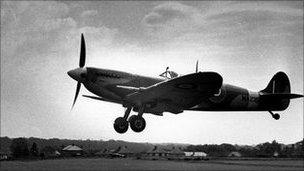Winston Churchill's Battle of Britain 'Few' remembered
- Published
Whitehall fly-past event commemorates Churchill's 'The Few' speech
The 70th anniversary of the Battle of Britain has been marked by a reading of one of Sir Winston Churchill's most famous speeches and a fly-past.
Actor Robert Hardy read extracts from Churchill's "so much owed by so many to so few" speech, precisely 70 years after the address in Parliament.
The reading outside the Churchill War Rooms was followed by a Spitfire and Hurricane fly-past over Whitehall.
The RAF defeat of the Luftwaffe is seen as a turning point in World War II.
Robert Hardy, who has portrayed Britain's wartime leader several times on film, delivered his words at 1552 BST - exactly the same time as the original speech.
Dame Vera Lynn, whose songs did so much to lift the morale of Britons during the war, was also at the event.
She said of Churchill's speech: "He was talking about a collection of very brave chaps and we are all grateful and thankful that we had them at the time.
"It's right and proper that we should always remember them. They were a few but they did a fantastic, big job."
German advantage
Squadron Leader Geoffrey Wellum, 89, from Mullion in Cornwall, and a Battle of Britain veteran, was impressed by the commemoration.
He said: "It was a very good speech that made you think that it was all worthwhile.
"The interest shown by people is very rewarding in that we don't want medals, we don't want even to be thanked.
"But it's nice to be remembered because it covers the whole lot of us - those of us who survived and those who made the extreme sacrifice."
Adolf Hitler had Britain in his sights after the evacuation of British forces from Dunkirk in June 1940.
But Britain retained naval superiority and Hitler knew that an amphibious invasion would be made easier if Germany could establish control of the air in the battle zone.
The Luftwaffe had the clear advantage - 750 long-range and 250 dive bombers, 600 single-engined and 150 twin-engined fighters - which was significantly more than RAF Fighter Command's 600 planes.
The Battle of Britain began on 10 July 1940 and ended on 31 October when, despite the German advantage, the Luftwaffe were pushed back by the determination and preparedness of the RAF.
More than 2,900 British, Commonwealth and Allied aircrew took part.
One in three of these young men - the average age of a pilot was 22 - was either killed or wounded.
The pilots were assisted significantly by the availability of radar and by the efforts of the ground crew, observers, plotters and commanders in Operations Headquarters.
'Spirit of a nation'
The bravery of the RAF pilots was captured in then Prime Minister Winston Churchill's speech on 20 August 1940 when he said: "Never in the field of human conflict was so much owed by so many to so few".

One in three men who flew in the Battle of Britain was killed or wounded
Phil Reed, director of the Churchill War Rooms, said: "In this speech, Churchill epitomised his ability to capture in the most stirring way the spirit of a nation fighting for its existence, as Britain stood firm against the Nazi war machine.
"Now part of the general folklore of the battle, the speech is today considered a defining moment of the conflict and one of Churchill's most emotive and stirring pronouncements."
The commemorative speech reading and fly-past at Whitehall is being attended by battle veterans.
The Spitfire and the Hurricane landed at Biggin Hill airfield in Kent as part of a tour of key Battle of Britain fighter bases across south-east England, before heading to Whitehall.
- Published19 August 2010
- Published20 August 2010
- Published16 August 2010